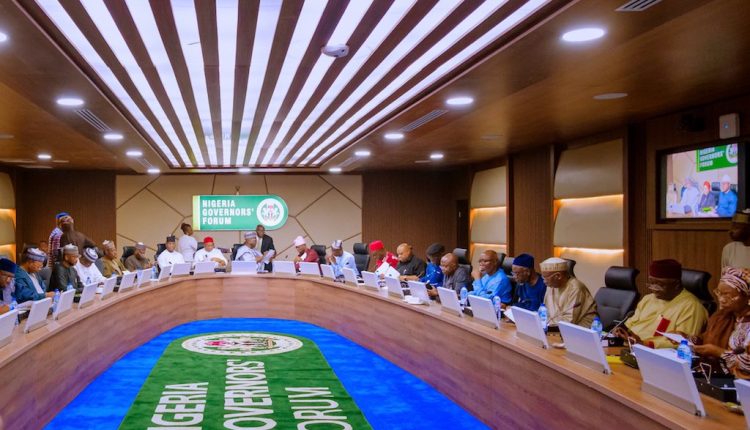BREAKING: Response To Insecurity Must Begin At Grassroots, Governors Tell Monarchs

The Nigerian Government is asking traditional rulers to champion the fight against insecurity which, it said, must begin in the grassroots.
To drive the agenda, the government is pushing ahead with the Proposed Bill to Establish the National Council for Traditional Rulers which will enable them to be actively involved in governance.
The chairman of the Joint Committee of the Nigerian Governors Forum (NGF) and National Council for Traditional Rulers (NCTR) Joint, Hope Uzodinma, who briefed journalists on the outcome of their meeting in Abuja, said the current security challenges has made it necessary that the ungoverned and rural spaces be properly manned with the involvement of traditional institutions through a non-kinetic approach.
Uzodinma, who is also Governor of Imo State said the provision in the Bill for traditional rulers to be members of State and National Security Councils is symbolic, strategic and overdue.
He said, “Sometime last year, the Nigerian Governor’s Forum had a special meeting with the National Council of Traditional Rulers on the need to get our traditional rulers involved in the management and governance of our people at the rural level and the need to take advantage of the ongoing constitutional amendment program to recognise and assign some responsibilities to our traditional institutions.
“As a result of that, a sub-committee was set up. And today, that sub-committee made up of some members of Nigerian Governors’ Forum and some members of the National Council of Traditional Rulers met, working out ways to ensure that Nigeria Governors Forum also come forward to support our traditional institutions and leaders into having a defined constitutional responsibility in the new amendment.
“We met today, they did their presentation and they almost got our buy-in. We will take our report at the end of the day to the larger Board of Nigerian Governors Forum, and if adopted, we will follow up with National Assembly to ensure that it is co-opted into the new alteration that is being expected.
“The current situation in the country in terms of insecurity has made it very possible and necessary that the ungoverned spaces and the rural spaces must be manned properly and efficiently. There is no other way of doing this if we don’t involve and include the traditional institutions.
“That is why we are supporting the creation of a role for the traditional institutions so that the kinetic approach that is being deployed by the security agencies will be supported by the non-kinetic approach from the traditional rulers for a win-win situation.”
Earlier in his opening speech, Uzodinma said the engagement reflects the government’s continued commitment to reinforcing the foundations of governance and community leadership in Nigeria.
He said, “We convene at a time when our country continues to contend with complex security challenges. These are challenges that reflect the fraying of community cohesion in some regions. As a government committed to lasting peace and stability, we recognise that addressing these issues requires more than top-down interventions. It calls for robust, community-based solutions that leverage the unique authority, moral standing, and reach of our traditional rulers.
“The proposed constitutional amendment offers a unique opportunity to formally anchor traditional institutions within Nigeria’s governance architecture. The Bill rightly acknowledges traditional rulers not only as custodians of culture and history but also as essential advisors on issues of customary law, inter-communal relations, and crucially, security and public order.
“We must recognise that crime is local. Insurgency, banditry, communal violence, and even the spread of misinformation all begin in communities before escalating to national crises. It is therefore only logical that our response to insecurity must begin at the grassroots.
“Traditional rulers are uniquely positioned to offer early warning, foster reconciliation, and galvanise support for state-led interventions. In this regard, Governors across the federation have consistently advocated for a bottom-up approach to security. This includes stronger linkages between community leadership and formal security institutions, as well as the integration of traditional councils into local and state security frameworks.
“The provision in the Bill for traditional rulers to be members of the State and National Security Councils is not just symbolic, it is strategic and overdue.
“The political economy of security in Nigeria demands that we go beyond reactionary policies. We must invest in building resilient community structures with the legitimacy to mediate conflicts, mobilise citizens, and collaborate with state actors in addressing root causes of insecurity. This bill is a bold and necessary step in that direction.
“With the Bill having successfully passed second reading in the Senate, the meeting provides a timely platform to consolidate our collective position on the provisions and ensure they reflect practical realities on the ground.
“Our focus must now shift to refining the institutional framework, clarifying the interface between traditional authorities and elected officials, particularly at the local government level, and developing strategies for effective implementation.”
